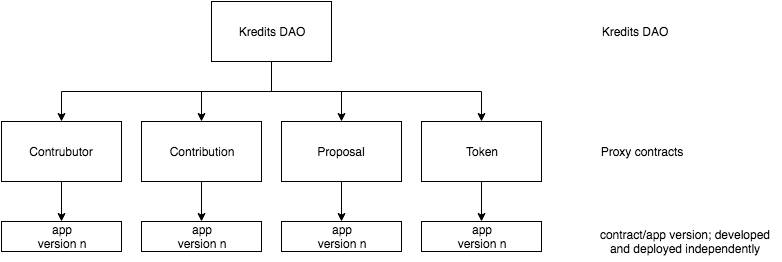README
Kredits Contracts
This repository contains the Solidity smart contracts organized as Aragon apps and JavaScript API wrapper for Kosmos Kredits.
It is based on aragonOS and follows the aragonOS conventions. Aragon itself uses the Truffle framework for some things.
Development
Installation
App dependencies
All requirements are defined in package.json.
$ npm install
Each of the aragon apps are separate packages:
$ cd apps/[app]
$ npm install
You can use npm run install-all to install all app dependencies at once.
Sytem dependencies
Aragon CLI and Truffle need to be installed on your sytem as well:
npm install -g @aragon/cli
npm install -g truffle
Local development chain
For local development it is recommended to use ganache to run a local development chain. When using the ganache simulator, no full Ethereum node is required.
We use the default aragon-cli devchain command to configure and run a local development ganache.
$ npm run devchain (or aragon devchain --port 7545)
To clear/reset the chain use (e.g. if you run out of funds on your devchain)
$ npm run devchain -- --reset (or aragon devchain --port 7545 --reset)
We default to port 7545 for development to not get in conflict with the default Ethereum RPC port.
You can also set certain ganache options to configure the devchain, for example
if you want to increase the block time to 10 seconds you can add
--block-time=10.
Bootstrap
Run an Ethereum node and ipfs
$ npm run devchain $ ipfs daemonCompile contracts
(compiled contracts will be in `/build`) $ npm run compile-contractsDeploy each app to the devchain
(make sure you've run `npm install` for every app - see installation) $ npm run deploy:appsDeploy a new KreditsKit and create a new DAO with the latest app versions
$ npm run deploy:kit $ npm run deploy:daoExecute seeds to create demo contributors, contributions, etc. (optional)
$ npm run seeds
Step 2-5 is also summarized in npm run bootstrap
If you want to reset your local setup:
$ npm run reset // deploys a new kit and a new DAO
$ npm run reset:hard // deploys all apps and does reset
Contract architecture
Contracts are organized in independent apps (see /apps) and are developed and
deployed independently. Each app has a version and can be "installed" on the
Kredits DAO independently.

A DAO can be deployed using the scripts/deploy-kit.js script or with the
npm run deploy:dao command. This deploys a new Kredits DAO, installs the
latest app versions and sets the required permissions.
See each app in /apps/* for details.
Helper scripts
scripts/ contains some helper scripts to interact with the contracts from the
CLI. At some point these should be moved into a real nice CLI.
To run these scripts use truffle exec. For example: truffle exec scripts/add-proposal.js.
Some scripts are also defined as npm script, see package.json.
cli.js
Call any function on any contract:
$ truffle exec scripts/cli.js
repl.js
Similar to cli.js but only provides a REPL with an initialized kredits
instance.
$ truffle exec scripts/repl.js
add-{contributor, contribution, proposal}.js
Script to add a new entries to the contracts using the JS wrapper
$ truffle exec scripts/add-{contributor, contribution, proposal}.js
list-{contributors, contributions, proposals}.js
List contract entries
$ truffle exec scripts/list-{contributors, contributions, proposals}.js
send-funds.js
Sends funds to an address. Helpful in development mode to for example fund a metamask account.
$ truffle exec scripts/send-funds.js
seeds.js
Run seeds defined in config/seeds.js.
$ truffle exec scripts/seeds.js
or
$ npm run seeds
current-address.js
Prints all known DAO addresses and the DAO address for the current network
$ truffle exec scripts/current-address.js
or
$ npm run dao:address
deploy-kit.js
Deploys a new KreditsKit that allows to create a new DAO
$ truffle exec script/deploy-kit.js
or
$ npm run deploy:kit
Kredits configuration options:
Configuration options can be set in an environment specific kredits object in the arapp.json or using a CLI parameter.
- daoFactory: Ethereum address of the used DAO Factory. On public networks we use official aragon factories
- apmDomain: the ENS domain of the aragonPM (normally
open.aragonpm.eth)
(please also see the arapp.json related configuration options)
new-dao.js
Creates and configures a new DAO instance.
$ truffle exec script/new-dao.js
or
$ npm run deploy:dao
KreditsKit address is loaded from lib/addresses/KreditsKit.json or can be
configured through the KREDITS_KIT environment variable.
deploy-apps.sh
Runs npm install for each app and publishes a new version.
$ ./scripts/deploy-apps.sh
or
$ npm run deploy:apps
Deployment
Apps deployment
To deploy a new app version run:
$ aragon apm publish major --environment=NETWORK_TO_DEPLOY
KreditsKit
deploy the KreditsKit as Kit to create new DAOs
$ truffle exec scripts/deploy-kit.js --network=NETWORK_TO_DEPLOY
Creating a new DAO
make sure all apps and the KreditsKit are deployed, then create a new DAO:
$ truffle exec scripts/new-dao.js --network=NETWORK_TO_DEPLOY
ACL / Permissions
Upgradeable contracts
We use aragonOS for upgradeability of the different contracts. Refer to the aragonOS upgradeablity documentation for more details.
Example
- Setup (see #Bootstrap)
- Deploy each contract/apps (see
/apps/*) - Create a new DAO (see scripts/deploy-kit.js)
- Deploy each contract/apps (see
- Update
- Deploy a new Version of the contract/app (see
/apps/*) - Use the
aragon dao upgradecommand to "install" the new version for the DAO (aragon dao upgrade <DAO address> <app name>)
- Deploy a new Version of the contract/app (see
Known Issues
When resetting ganache Metamask might have an invalid transaction nonce and transactions get rejected. Nonces in Ethereum must be incrementing and have no gap.
To solve this reset the metamask account (Account -> Settings -> Reset Account)
